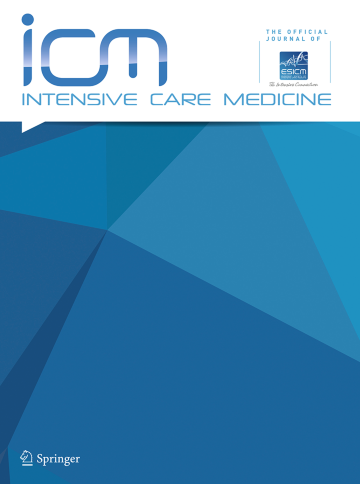急性肠系膜缺血危重患者的抗凝治疗和预后:一项国际研究。
IF 27.1
1区 医学
Q1 CRITICAL CARE MEDICINE
引用次数: 0
摘要
背景:急性肠系膜缺血(AMI)与低生存率相关。建议AMI患者尽早开始全剂量抗凝治疗,无论病因、手术或手术角度或凝血状态如何。然而,国际上还没有关于抗凝治疗时间和剂量对重症监护病房(ICU) AMI患者预后影响的研究。方法这项国际研究综合了来自19个国家33个ICU中心的数据。主要终点为30天生存率。次要结局评估机械通气时间、ICU住院时间、出血性并发症发生率和90天生存率。我们还确定了影响30天生存率的独立危险因素。结果370例患者中,183例接受了早期全剂量抗凝治疗,187例未接受。早期接受全剂量抗凝治疗的患者30天生存率为53.5% (n = 98),未接受全剂量抗凝治疗的患者30天生存率为41.7% (n = 78) (p = 0.01),需要治疗的人数(NNT)为n = 8。早期全剂量抗凝与较长的机械通气时间相关(p = 0.01)。在ICU的住院时间和出血性并发症方面没有观察到差异。早期接受全剂量抗凝治疗的患者在90天生存率持续提高(p = 0.02)。我们定义了4个多变量Cox风险模型用于30天生存率。只有两种干预治疗与生存相关:早期全剂量抗凝血和血运重建术和/或肠切除术。结论ICU急性肠系膜缺血患者早期全剂量抗凝治疗有显著的生存获益,出血并发症无显著差异。早期全剂量抗凝、血运重建术和/或肠切除术与生存相关。本文章由计算机程序翻译,如有差异,请以英文原文为准。
Anticoagulation management and outcomes in critically ill patients with acute mesenteric ischemia: an international study.
BACKGROUND
Acute mesenteric ischemia (AMI) is associated with low survival rates. It is recommended to start early a full dose of anticoagulation therapy in patients with AMI, regardless of etiology, surgical or procedural perspective, or coagulation status. However, there are no international studies addressing the impact of timing and dose of anticoagulation therapy on outcome in AMI patients hospitalized in the intensive care unit (ICU).
METHODS
This international study combined data from 33 ICU centers in 19 countries. The primary outcome was 30-day survival. Secondary outcomes assessed duration of mechanical ventilation, ICU length of stay, occurrence of hemorrhagic complications and 90-day survival. We also identified independent risk factors for 30-day survival.
RESULTS
Among the 370 analyzed patients, 183 received early full-dose anticoagulation therapy and 187 did not. The 30-day survival was 53.5% (n = 98) in patients receiving early full-dose anticoagulation therapy and 41.7% (n = 78) in patients who did not (p = 0.01), with a number needed to treat (NNT) of n = 8. Early full-dose anticoagulation was associated with a longer duration of mechanical ventilation (p = 0.01). No differences were observed in ICU length of stay or hemorrhagic complications. Improved survival persisted in patients receiving early full-dose anticoagulation at 90 day (p = 0.02). We defined four multivariate Cox hazard models for 30-day survival. Only two intervention therapies were associated with survival: early full-dose anticoagulation and revascularization and/or bowel resection.
CONCLUSION
This study suggests a significant survival benefit of early full-dose anticoagulation in ICU patients with acute mesenteric ischemia and no difference in hemorrhagic complications. Early full-dose anticoagulation and revascularization and/or bowel resection were associated with survival.
求助全文
通过发布文献求助,成功后即可免费获取论文全文。
去求助
来源期刊

Intensive Care Medicine
医学-危重病医学
CiteScore
51.50
自引率
2.80%
发文量
326
审稿时长
1 months
期刊介绍:
Intensive Care Medicine is the premier publication platform fostering the communication and exchange of cutting-edge research and ideas within the field of intensive care medicine on a comprehensive scale. Catering to professionals involved in intensive medical care, including intensivists, medical specialists, nurses, and other healthcare professionals, ICM stands as the official journal of The European Society of Intensive Care Medicine. ICM is dedicated to advancing the understanding and practice of intensive care medicine among professionals in Europe and beyond. The journal provides a robust platform for disseminating current research findings and innovative ideas in intensive care medicine. Content published in Intensive Care Medicine encompasses a wide range, including review articles, original research papers, letters, reviews, debates, and more.
 求助内容:
求助内容: 应助结果提醒方式:
应助结果提醒方式:


